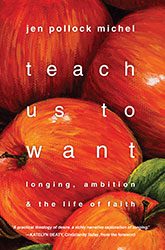 Jen Pollock Michel’s Teach Us to Want: Longing, Ambition, and the Life of Faith is an honest and insightful book, born of her own experience of responding to the legion of desires characteristic of daily life as a mother, spouse, and professional seeking to be faithful to God’s call. She invites us to explore the deepest desires of our hearts, to examine the relationship between what we want and God’s vision for us, and affirmatively recognize the power of desire, rightly held, to transform our lives for the good.
Jen Pollock Michel’s Teach Us to Want: Longing, Ambition, and the Life of Faith is an honest and insightful book, born of her own experience of responding to the legion of desires characteristic of daily life as a mother, spouse, and professional seeking to be faithful to God’s call. She invites us to explore the deepest desires of our hearts, to examine the relationship between what we want and God’s vision for us, and affirmatively recognize the power of desire, rightly held, to transform our lives for the good.
Our desires can be too small, individualistic, self-concerned, and carnal, and they can also be catalytic for the energy that enables us to serve others and bring beauty to the world. They can be the energy of healing and creative transformation.
As I read Pollock’s text, I pondered a couple biblical passages: Jesus’ promise that we can do “greater things” even than he did (John 14:12) and James’ admonition that “You do not have, because you do not ask. You ask and do not receive, because you ask wrongly, in order to spend what you get on your pleasures.” (James 4:2b-3) God is not opposed to desire; in fact, faith and love are all about desire – the divine eros – for something greater and more expansive in alignment with God’s vision for you and the world. The biblical story describes a passionate and erotic God, who wants humankind to have abundant life personally, filially, and corporately. The divine pathos (Heschel) is aimed toward justice in the large and small.
Too often our desires are too small, when God is willing to give us “more than we can ask or imagine, according to God’s power working within us.” (Ephesians 3:20) God wants us to make big plans, and expect great things of God and ourselves. This “greatness” is not according to the world’s standards, but according to our personalities and gifts, our life situation, our current possibilities, and the welfare of the world around us. Greatness is always personal and contextual.
The deepest desires of our hearts invite us to greatness as Christ’s companions. Deep desire is different from passing desire. There is a Godwardness in all of us, and our orientation toward God is more primordial than our orientation toward sin. Still, we are part of a world in which our desires can be subverted, compromised, misused, and turned toward the needs of the false and ego centered self. Discovering our desires is essential to a good and godly life. Seeing our desires as part of a process of spiritual formation is what enables us to choose great things – to do something beautiful for God and do small things with great faith (Mother Teresa) – and use them or the greater good of others and our own fulfillment.
My teacher Bernard Loomer spoke about “size” or “stature” as a central religious theme. Can we embrace a plethora of possibilities and keep our personal, God-oriented, integrity? Can we become “large souls” who embrace possibility and diversity, congruent with God’s great vision?
God calls and we respond, and in our response we give a special twist and character to God’s vision. God does not want rubber stamp disciples but creative companions. God’s will – I prefer vision – is intended to nurture creativity and freedom, not eliminate it. We are to desire the most creative, innovative, and freeing possibilities and test them through the crucible of prayerful actions.
This is surely one meaning of Mary Oliver’s famous line “What is it you plan to do with your one wild and precious life?” Death is so near, life is so brief, and the call of desire is to live wonderfully, beautifully, and lovingly in the time of your life.
Desire is healthy. While the objects of our desire may hurt us and others, the eros of life, reflecting the Divine Eros, urges us onward and that desire is good. This is where prayer comes in: prayer is the invitation to seek big things, to be spacious in our imagination, to demand that we be world-shapers, and that we see everything we do in light of God’s all-encompassing care. In the spirit of Jesus’ Sermon on the Mount, we can ask and seek for great things and make great plans, and let these possibilities be energized by the great desire to bring beauty, love, joy, and even pleasure to us and, most central, others and this good earth in all its intricate and fragile beauty.
Read an excerpt from Teach Us to Want at the Patheos Book Club here!












